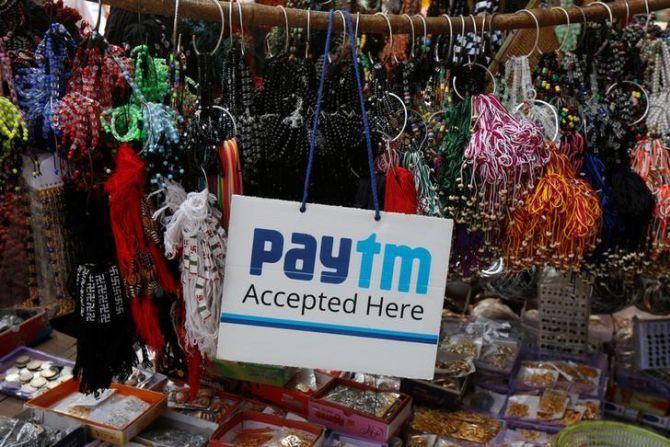According to analysts, the market has punished the stock for a thinly spread business model, scant revenues and an unclear path to profitability.
Deepsekhar Choudhury reports.

Paytm CEO Vijay Shekhar Sharma said on Wednesday that the company's share market performance has been in line with that of global peers in the sector over the past six months due to macroeconomic factors.
“Macro factors like quantitative easing, free money due to US monetary policy and other parameters led to a spook in the market in terms of pricing the IPO.
"Paytm’s shares have received a similar response to that of global peers in the last six months…But that is not a complete reasoning.
"What happened to the IPO is still a question,” he said.
The stock hit a high of Rs 1,961.05 on November 18, but has failed to touch its issue price since listing.
On a lighter note, Sharma indicated that he would have bought more shares of Paytm if he could as it was trading cheaply.
“It is just that my compliance team says I cannot buy back for six months,” he said.
According to analysts, the market has punished the stock for a thinly spread business model, scant revenues and an unclear path to profitability.
While Paytm valued its IPO at Rs 1.49 trillion ($20 billion), it currently has a market capitalisation of around Rs 70,240 crore ($9.5 billion).
Speaking at the India Digital summit organised by IAMAI, Sharma said the right way to benchmark Paytm's loan business performance would be to measure its growth in terms of number of loans disbursals in the past three years against a three-decades old player like Bajaj Finance.
However, he maintained that Paytm's smaller average ticket size of loans is by design to be such to ensure better quality of loans.
“The problem of our country has been that the metric people chase is the size of loans.
"The better metric is the quality of loans. If we had Rs 5,000, Rs 10,000, Rs 15,000 loan sizes we would have been a better country today,” he said.
Brokerage firm Macquarie came out with a report on Paytm, maintaining its ‘underperform’ rating and cutting its target price for the stock to Rs 900.
It flagged attrition in the company’s senior management, its average merchant loan size at sub-Rs 5,000 levels over the past year and regulatory uncertainty in fintech and insurance spaces as concerns.
According to Macquarie analysts, the Reserve Bank of India’s proposed digital payments regulations could cap wallet charges.
This business still accounts for 70 per cent of Paytm’s overall gross revenues and, hence, any such regulation could impact revenue significantly.
Add to that the recent rejection of Paytm’s foray into insurance by the Insurance Regulatory and Development Authority.
“We believe this could impact the company’s prospects of getting a banking license,” the Macquarie analysts noted.
However, the Paytm CEO countered the argument saying that government policy and RBI regulation have done anything to hurt fintech in the country.
“It is only a problem when somebody tries to act smart with the regulator.
"That is when the regulator says ‘I know what you are doing there,’” he quipped.
Sharma also said that although online insurance and wealth management offer good opportunities to the fintech sector due to under-penetration, it is lending that has the biggest capacity of generating revenues in financial services.
On being asked what the biggest areas of opportunity for technology start-ups in the country during the next decade, he pointed to healthcare and electric vehicles.
“I have been driving an EV for the last one month and no one can go back to their earlier automobiles after using an EV… And healthcare because it is what people are ready to pay for,” he said.
Photograph: Rupak De Chowdhuri/Reuters












 © 2025
© 2025